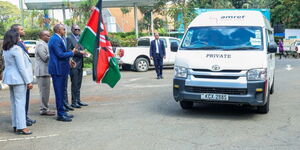The National Transport and Safety Authority (NTSA) had a hard time on Tuesday before Parliament over the slow implementation of the Smart Driving License project, which has been plagued by delays and inefficiencies.
Appearing before the Public Investments Committee (PIC) on Governance and Education chaired by Jack Wamboka, NTSA Director General George Njao was questioned about the project stagnation and supposed wastage of public funds on the procurement of smart cards for the Smart Driving Licence project.
According to an audit report presented during the meeting, NTSA procured 4,042,050 smart cards at Ksh1.19 billion.
However, as of March 2025, only 1,479,176 cards had been printed and issued over six years. This meant that 2,562,874 smart licenses—valued at Ksh788 million—are lying unused in NTSA stores, raising concerns over mismanagement and lack of urgency in implementing the digital transition.
The lawmakers criticised the NTSA for failing to meet the initial three-year project timeline, which was meant to conclude in March 2020.
The committee expressed concerns that the delay, now in its fourth year, not only risked wasting public funds but also undermined efforts to modernise Kenya’s transport sector.
NTSA officials admitted to the delays but assured lawmakers that plans were in place to accelerate production and issuance.
Beyond the Smart Licence rollout, MPs also questioned NTSA on other governance issues, including the lack of a clear policy on issuing laptops to board members and the agency's failure to account for 15 parcels of land used for motor vehicle inspection.
Lawmakers demanded that NTSA fast-track the land valuation process and ensure the properties are officially recorded in financial statements by June 30, 2025.
In a bid to ensure equal access to the safety body’s services across the country, lawmakers called for affirmative action to ensure NTSA services are accessible in all 47 counties.
The committee further raised concerns over unequal service distribution, noting that some regions had multiple NTSA offices while others had none, making it difficult for citizens to access essential transport services.
The PIC vowed to push for reforms to ensure that NTSA improves efficiency, enhances transparency, and prevents wastage of taxpayer funds in future projects.












